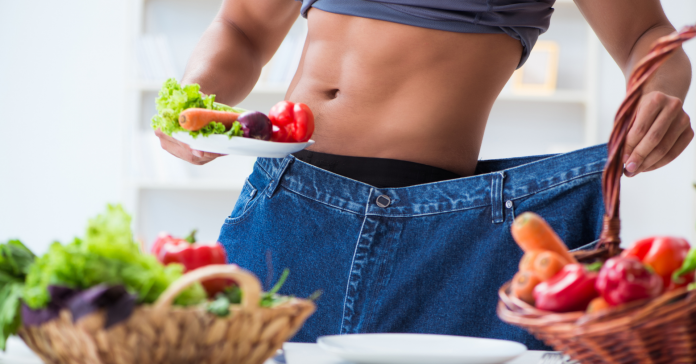Following a traditional diet and exercise plan can be difficult. However, there are several proven tips that can help you eat fewer calories with ease and to prevent weight gain in the future.
Here are 5 ways to lose weight without diet or exercise based on science.
1) Chew slowly and thoroughly
Chewing your food thoroughly makes you eat more slowly, which is associated with decreased food intake, increased fullness and smaller portion sizes. How quickly you finish eating can also affect your weight.
A recent review of 23 observational studies reported that faster eaters are more likely to gain weight than slower eaters.
Fast eaters are also much more likely to be obese. To get into the habit of eating more slowly, it may help to count how many times you chew each bite. Eating your food slowly can help you feel more full with fewer calories. It is an easy way to lose weight and prevent weight gain.
2) Use Smaller Plates for Unhealthy Foods
The typical plate of food today is larger than it was several decades ago, which can contribute to weight gain as a smaller plate can help you eat less by making the portions appear larger. The portions on a larger plate seem to be smaller, which causes you to add more food. You can use this to your advantage by serving healthy foods on larger plates and less healthy foods on smaller plates.
3) Eat Plenty of Protein
Protein has powerful effects on appetite. It can increase feelings of fullness, reduce hunger and help you eat fewer calories. This may be because protein affects several hormones that play a role in hunger and fullness, including ghrelin and GLP-1.
One study found that increasing protein intake from 15% to 30% of calories helped participants eat 441 fewer calories per day and lose 11 pounds over 12 weeks, on average, without intentionally restricting any foods.
If you currently eat a grain-based breakfast, you may want to consider switching to a protein-rich meal, such as eggs. Some examples of high protein foods include chicken breast, fish, Greek yoghurt, lentils, quinoa and almonds.
4) Eat Fiber-Rich Foods
Eating foods high in fibre can increase feelings of fullness, helping you feel fuller longer. Research has also shown that one type of fibre, viscous fibre, is especially beneficial for weight loss. Increases fullness and decreases food intake.
5) Drink Water Regularly
Drinking water can help you eat less and lose weight, especially if you drink it before meals. Participants who drank water before meals lost 44% more weight over a 12-week period than those who did not. If you substitute water for high-calorie drinks like soda or juice, you may notice an even greater effect.
In conclusion, many simple lifestyle habits can help you lose weight. Some have nothing to do with a regular diet or exercise plan. You can use smaller plates, eat more slowly, drink more water and switching your diet to include more protein-rich foods and fibre. However, it’s probably best not to try all these things at once. Experiment with one technique for a while, and if that works well for you then try another one.
A few simple changes can have a big impact on your weight in the long run.


